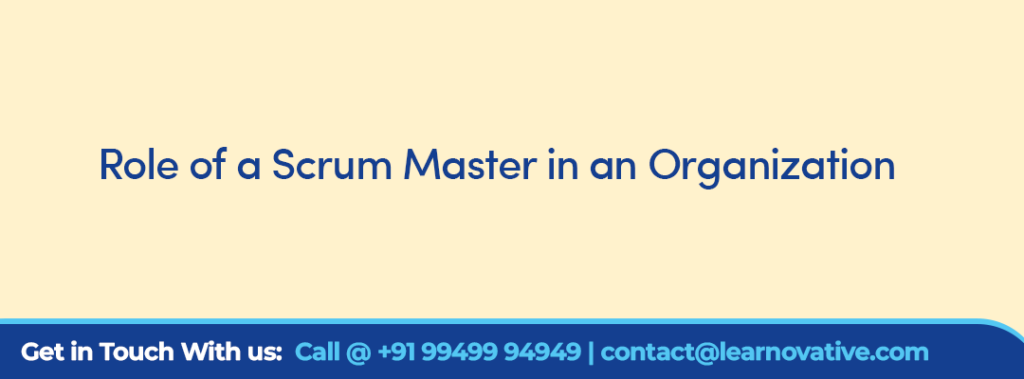
Scrum has 3 roles: Scrum Master, Product Owner, Development Team. There has been a gray area of understanding in the role of Scrum Master. I am trying to attempt to get a bit of clarity on the role so that individuals who want to get into this role as well as Organizations who want to transform into Scrum can get a better understanding of the Scrum Master Role.
Scrum Expert: Scrum Master should have a clear and deep understanding of Scrum framework. This helps to distinguish intellectual gymnastics (anti-patterns) and to protect the teams and organizations from the wrong Scrum practices. You can get this expertise by updating yourself with the latest version of Scrum Guide (scrumguides.org) and also following few Scrum blogs and community of practices to understand what are different common anti-patterns and how they create negative impact within organizations and what can be done to avoid those anti-patterns. At the end, you must be courageous and committed to help your organization to implement to the possible best extent through your scrum expertise.
Change Agent: “You cannot improve without change”. Individuals and Organizations cannot become better without changing. The word “Change” has a wider spectrum. It may vary from an individual’s mindset change to the organizational leadership behaviour change. Change is not easy because every change comes with resistance. So as a Scrum Master you have to lead the change in individuals and organizations using respective change management models. You need to explore these models and get experience in using these models (example: ADKAR).
Removes Impediments: Generally, people think that Scrum Master is responsible for each and every impediment, this is not true. Scrum Master should focus on systemic impediments where the team does not have Power or Ability of Knowledge to resolve the impediments. Wherever the team is able to resolve the impediments on their own, they should resolve without waiting for the Scrum Master as they should be “Self-organized”. This will help Scrum Master to focus on global/systemic impediments. You need to have a fair understanding on the organizational culture, better networking within the organization, influential and negotiation skills in order to get support to resolve the global impediments. The faster you resolve these impediments the higher trust you will create with your team.
Understands how to Increase Visibility: Scrum highly promotes transparency. In fact the foundation of Scrum is empiricism and “Transparency” is the first leg of empirical process control. As a Scrum Master you should find ways to increase the transparency within your team and your organization so that it helps to achieve shared understanding. Introducing organizational level impediments boards, community of practices will help you to increase transparency.
Must Protect the Team: Recently in one of the conferences I met a person who is a ScrumMaster. In the discussion there was a topic related to protecting the team. That person told he was protecting his team very well, when I asked how he was doing he told “it is very simple, I kept them in a closed room and locked the room”. This is not the way to protect the team. You need to help others who want to interrupt the team (even the Product Owner also) during the Sprint, help them understand what kind of interactions are helpful to the team and what are harmful. This is also creating awareness. You have to help people understand why the team should not be disturbed and how it impacts the sprint goal and the team’s focus with the interruptions.
Makes sure the Product Owner manages Product Backlog Effectively: You need to help the Product Owner understand the importance of managing the Product Backlog effectively. A healthy Product Backlog helps to maintain the sustainable pace and also the team can confidently pull items into the Sprint Backlog during the Sprint Planning. So frequently checking the Product Backlog for the upcoming items and ensuring they are “ready” and if enough items are not “ready” then talk to the Product Owner and ensure he/she conducts the backlog refinement and gets the items ready. Another important point regarding the Product Backlog items is the level of details. Sometimes, the acceptance criteria is ambiguous, or most of the clarifications are not answered. In that case, the team cannot proceed with estimation of those items and they won’t be confident about those items to pull into the Sprint Backlog.
Active Listener & Observer: Listening and Observing are the two powerful tools for the Scrum Master to be effective in that rol. In order to use these techniques, the Scrum Master should work closely with the team. It helps him/her to identify any dysfunctions within the team (communication issues, collaboration issues, conflicts) and accordingly help them address time to time so that the overall team’s productivity, flexibility and creativity will improve. Basically using the listening and observation you need to “improve the ability to improve” within the team.
Servant Leader: Servant leader is not the one who “leads the servants” 
Trainer & Coach: At times you may have to train your team in Scrum framework, communication skills, soft skills and so on. So you need to learn some training skills (check TBR: Training from the Back of the Room for more information) and learn how to engage people, how to create interactive based learning programs. Coaching is helping people understand the problem on their own and help them figure out solutions on their own by asking powerful questions. It is not about you providing the solution, rather you help them find the solutions. To be a successful coach, you need to develop a coaching mindset and also understand the coaching competencies. It is also required to learn some coaching techniques. Refer to my other blog (How to build your career towards Agile Coach?) for more information this.
Effective Facilitator: Facilitation means “make things easy”. Effectively planning, conducting and concluding decision making or consensus or group setting is called facilitation. As a Scrum Master you may have to facilitate the Scrum events as and when there is a need. So you need to understand different facilitation techniques in order to enable the decision making. Important point here is, you are not the decision maker, you are just the decision enabler. So you need to have few characteristics such as Neutral, does not own outcome or decision, does not stand in front to become an effective facilitator. Also, as a facilitator, you need to observe the dysfunctions during the meetings and use respective techniques to address those dysfunctions. Explore some useful facilitation techniques such as (Fist of Five, Dot voting, ELMO, ROTI).
Responsible for Scrum Adoption: You have to ensure the Scrum is implemented the way it has to be at the team level as well as organization level. In order to achieve this as a Scrum Master you will have services to your Product Owner, Development Team and the Organization. Depending on the need you provide these services. You also have to work closely with other Scrum Masters within the organization to optimize the collaboration, communication, practices, tools and so on. Forming a community of practice is a proven practice in order to implement Scrum effectively.
To conclude, you as a Scrum Master have a higher level of responsibility in the role and you have to be courageous and be agile to become an effective Scrum Master. Prepare a personal backlog for yourself with all the things you would like to take up in the role and prioritize them based on importance and urgency and start executing them. Wish you all the very best.
Recent Posts
- How to make Daily Scrum more effective? 16/02/2024
- Effective Impediments management in Scrum 09/02/2024
- CSM Vs PSM certifications 01/02/2024
- Effective Management of Dependencies in a Multi team Scrum 01/02/2024
- Challenges for the Product Owner with multiple Scrum Teams 23/01/2024

